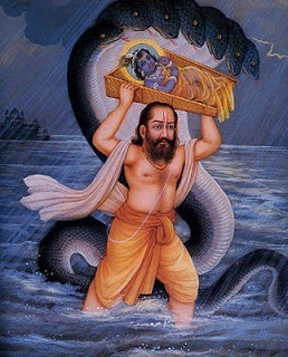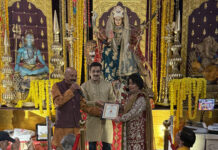 In the previous article, you learned that both souls and God have had unlimited number of janm (births) in the material world. One difference between God and the souls is that God can remember all of His janm and all of ours, but we cannot remember any.
In the previous article, you learned that both souls and God have had unlimited number of janm (births) in the material world. One difference between God and the souls is that God can remember all of His janm and all of ours, but we cannot remember any.
Are there any other differences between our janm and God’s? In the ninth shlok, Shree Krishna states that His janm is Divine, which implies that a soul’s janm is not Divine, or is material in nature. To understand the difference between a Divine janm and a material janm, let us look at an apparent contradiction in the fifth and sixth shloks of the fourth chapter.
Is Shree Krishna’s birth different than ours?
According to the sixth shlok in this chapter, Shree Krishna is never born. He uses the word ‘ajah’, for Himself, which means that He is ‘unborn’. But in the fifth shlok, He had said ‘bahuni janmani’, which means that He has had uncountable births. Which statement is correct?
At first glance, the statement that Shree Krishna is unborn seems correct. By very definition, it is impossible for God to be born. Who would give birth to God? If someone had given birth to God, it would mean that God couldn’t have existed without the help of that person, which would make God dependent on them. Then that person would have to be considered God, because it means they are more powerful than the one we thought was God.
But Vedas tell us that God is the supreme power Who is absolutely independent from anyone and everyone. He is ‘swayam siddh’, or self-supporting. Since His existence doesn’t depend on anyone else, He could not have been born from someone.
Also, God is eternal – since He has been here forever, it is impossible that He was ever born. He never needed to be born, because He has always existed. Thus, the statement that Shree Krishna is unborn – or ajah – seems correct.
However, we also know that Shree Krishna had a mother – Devki – and a father – Vasudev – in Mathura, which implies that He was born from them. And He Himself is telling Arjun that He has had uncountable janm.
This confusion will be cleared up if we understand the true meaning of the word ‘janm’. ‘Janm’ comes from the Sanskrit root ‘jani pradurbhave’, which means “prakat hona” or “to appear”. Therefore, janm doesn’t mean to be born, but rather, to appear. This means that Shree Krishna only appeared before Devki and Vasudev – He was not born from them.
In summary, we know that Shree Krishna was never born – He is ‘ajah’; but He has appeared in the world uncountable times – thus He has had uncountable janm. What about ordinary souls – is the same true for them? Are they simultaneously unborn and yet taking uncountable janm? The answer is yes.
Souls are also unborn, yet take janm
The same word – ‘ajah’ – has been used in the second chapter to describe souls (verse 20). Accordingly, it has been explained in detail in previous articles that all souls are eternal. Thus, they are also unborn – they never had a beginning – and they were never created. Nonetheless, each soul has taken uncountable janm (appeared uncountable times).
When we take our next janm, it is called reincarnation. When we reincarnate, we first leave our previous body, and then we are transferred into our new body, which will be growing in the womb of our new mother. However, the process of being transferred from one body to the next does not involve any kind of travel in the normal sense of the word. Since the soul is Divine, it can be instantly transferred anywhere in creation. Thus, when we enter our new body, we have not traveled there, but appeared there. This is why the term janm – or appearance – also applies to souls.
Thus, we see that both God and souls are unborn and eternal, and both God and souls take janm, or appear, and have done so uncountable times. We still need to understand why Shree Krishna’s janm is considered to be Divine, while souls’ janm is considered material. This will be answered in the next article.
Disciple of Jagadguru Shree Kripaluji Maharaj
Swami Nikhilanand Ji is a Canadian born Hindu spiritual leader based in Austin, Texas. He is a sanyasi disciple and pracharak of Jagadguru Shree Kripaluji Maharaj.
Attracted to the teachings of Hinduism from a young age, Swamiji eventually let his deep spiritual longing lead him to India, where he was most fortunate to come under the guidance of Shree Kripaluji Maharaj. Thereafter, living in the ashrams of JKP, he extensively studied Hindi, the philosophy of the prime Sanskrit scriptures (Vedas, Darshan Shastras, Gita, Bhagwatam), and practiced meditation in the tradition of raganuga bhakti. In 2003, he was given sanyas. Now, with the blessings of his Guruji, he offers satsang programs throughout America, engaging audiences with his clear explanations of Hindu philosophy coupled with inspired chanting of Sanskrit mantras and shlokas and charming nam sankirtan.
His informative and compelling speeches provide practical insight into how to adopt the teachings of Sanatan Dharm into our daily lives, and inspire us to awaken our inner spiritual potential.
To stay in touch with Swami Nikhilanand Ji, like his Facebook page at https://www.facebook.com/SwamiNikhilanand or follow him on twitter at https://twitter.com/Swami_Nikhil.
Swami Nikhilanand






